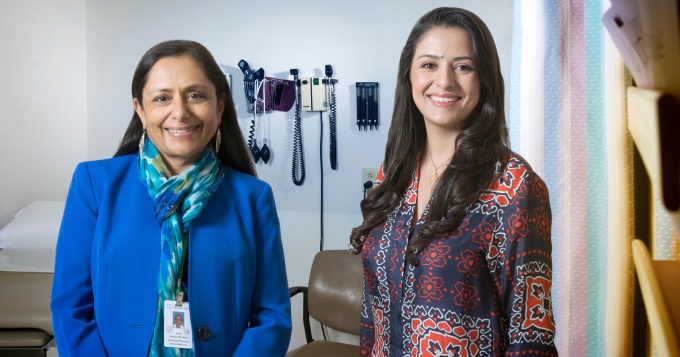Research

Research is important to program director Smita Bakhai, MD, MPH, FACP (left). She’s principal investigator on the $2.8 million Health Resources and Services Administration grant allowing us to expand this residency program.
Research is an important element of your training in our preventive medicine residency.
We offer protected time for research, and we encourage you to customize your work to your unique interests. We strive to integrate each resident’s passion and professional goals into the framework of our curriculum.
Mentor-Guided QI Projects
During your maternal health rotation, you’ll conduct quality improvement (QI) and health system transformation projects.
Because quality improvement projects will be specific to each primary care partner, as based on any areas of their weakness, you’ll have a range of opportunities to learn about project design and implementation.
Through monthly consultations with faculty, we’ll ensure your project is on track with appropriate design and implementation. Moreover, you can expect to work closely with primary care partner administration and faculty to track and monitor outcomes associated with access, quality of care and cost-effectiveness.
Our population health rotation and clinical preventive services rotation will be another opportunity for you to complete a QI project.
Wide Range of QI Topics
Your quality improvement project must utilize evidence-based approaches for documenting project outcomes, including but not limited to:
- electronic health records
- valid assessments for patient and provider satisfaction
- standardized cost-benefit analyses
For example, Yadunath Pokharel, MBBS, a resident in the related internal medicine-preventive medicine residency, has conducted research on:
- Improving Warfarin Safety During Clinical Merger Amid the COVID-19 Pandemic
- The purpose of this QI project was to increase time in therapeutic range to 65 percent from a baseline of 50 percent and maintain a monthly INR completion rate of 80 percent in patients on warfarin at a newly merged community-based primary care clinic in six months.
- Estimating Cardiovascular Risk in a Patient With Non-traditional Risk Factors
- With growing cancer survivors in the community, the researchers sought to examine more tools that can better predict cardiovascular disease (CVD) risk in this patient population. The researchers saw a discrepancy in CVD risk estimation using current models — and they found a need for further studies on nontraditional risk factors to guide accurate estimation of primary and secondary prevention.
Example: Program director’s QI efforts
Our program director, Smita Bakhai, MD, MPH, FACP, has in-depth experience with successful QI projects and will guide you as you undertake one of your own.
Learn about how her QI efforts have advanced guideline-directed medical therapy for heart failure:
Bakhai — who is the principal investigator on the $2.8 million Health Resources and Services Administration (HRSA) grant that has allowed us to expand this residency program — has mentored multiple resident-led QI projects that have received prestigious awards and poster presentations on national and international platforms.
Presenting at Local, Regional and National Meetings
We’ll ask you to present a poster of your QI project at the school’s Celebration of Scholarship, a poster presentation and competition sponsored by the Office of Graduate Medical Education. There, you will have the opportunity to showcase your research along with other residents and fellows.
We’ll also encourage you to attend local, regional or national conferences on topics pertinent to preventive medicine. Financial support for these conferences may be available if you are making a presentation.
Throughout the program, we’ll encourage you to prepare reports about your scholarly activities for publication or presentation.
Learn from Nationally Recognized Primary Care Research Faculty
As a resident in our program, you can benefit from our connection to the Primary Care Research Institute (PCRI).
Many of our faculty members are affiliated with the PCRI, which is a unit within the Department of Family Medicine that specializes in health services research. The institute includes expertise in clinical medicine, psychology, nursing, epidemiology, education, health system organization, program evaluation, quantitative and qualitative research methodologies, and systems management.
Nationally recognized as a leader in primary care research, the group’s focus includes areas such as community based participatory research, health disparity research, management of complex chronic conditions, health care practice transformation, comparative effectiveness research, translation of evidence into practice and health workforce training.
Faculty Publications and Presentations
Research by our faculty members frequently appears in leading academic journals and reflects our dedication to a range of primary care disciplines.